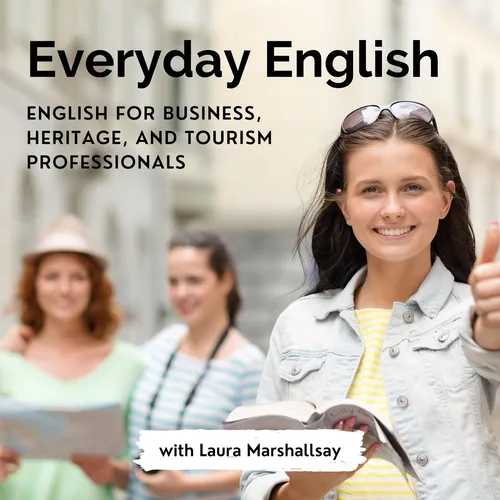
Everyday English
English communication skills for business, tourism, heritage, and museum professionals.
- Update frequency
- every 9 days
- Average duration
- 11 minutes
- Episodes
- 23
- Years Active
- 2020 - 2021

Is jargon hurting your ability to communicate clearly?
Abbreviations, acronyms, and nomenclatures can be useful communication tools for people within a group. The downside is that it’s a form of jargon and outsiders often have no idea what you are talkin…

Should we simplify everything we write?
My core belief when it comes to communication is that we should meet people where they are, not where we think they should be. That means texts should be written so the greatest number of people ca…

Keep it simple and speak to your audience.
For some reason, people think that to sound intelligent, or be taken seriously, they have to give long, complicated explanations. In fact, the opposite is true. There is a genius in simplicity. How…

Customer service is everything - how to make your guests feel like VIPs
People are ready to travel again, and that means reading online reviews. But how you communicate with your guests can mean the difference between getting 1 star or 5 stars. Read on to get my top tips…

Museum trends and Gen Z in a post-pandemic world
Generation Z (those 15-25 years old) feel invisible to those in power. How will this affect how you communicate with this age group? This week, we'll look at how young people feel about technology,…

Tell me a story - How to develop a tour people will remember
Often, it isn't a guide’s language skills that determine the quality of the tour. It is their ability to tell a good story. How do you do that? Listen and find out! If you'd like to get in touch, h…

Developing a tour when English isn't your first language
Here’s the technique I developed to help you create and give tours in English when English isn't your first language.
If you'd like to get in touch, have questions, comments, or your site needs hel…

Do you really need to be fluent?
To many, being fluent means using perfect grammar all the time, knowing nearly every word in the dictionary, and speaking without an accent.
Newsflash: for most people, this is not a realistic goal.
…
The professional benefits of volunteering
Landing a job that requires experience presents a real Catch-22 situation for anyone trying to break into a new field. How are you supposed to get professional experience if no one will give you a jo…

Communicate and change the world
You have an issue you want the world to know about. How do you communicate your message so that people not only listen, but they also care enough to do something about it? Join me today to find out!
…
Taking your message to the world - English for Activists
This week, I am breaking from my normal Business English blog to talk about something really close to my heart: grassroots activism. If you can tell people about your cause in your own language - th…

Communication as a stress reducer? Absolutely!
We are living in a world where people aren't sure what's happening from one week to the next. And that can cause stress. But did you know that one of the best ways to alleviate stress is good commu…

Are you sending the right message on your video calls?
During this pandemic, video calls have changed the way we communicate. But sometimes people forget that most communication is non-verbal. With that in mind, are you sending the right messages when …

Writing your CV, Part 3: Describing your professional experience
Last week, we looked at the Objective and Summary sections of your CV. This week, I'd like to discuss how to describe your professional experience. Do this well, and you will get that interview!
Ev…

Writing your CV, Part 2: the Objective and Summary
A recruiter takes less than a minute to decide whether to read your entire CV or not. This is why the Objective and Summary are so important. It introduces them to who you are and what you can do. Wr…

It's time to update your CV
Let's face it: with everything happening in the world, you might need to look for a new job. That means writing a CV, building your network, and job interviews. But what if you have to do it in Eng…

Easy ways to improve your English every day
Improving your English means engaging with the language outside of the classroom. But who has time for that? You do! Check out my fun, easy, everyday techniques to help you improve your English.

Say it ain't so: the top errors native English speakers make (and how to avoid them!)
Believe it or not, native speakers make grammar mistakes, too. This week, we are going to look at some of the errors native English speakers make and I'll give you tips on how to get it right.
For…

Preparing for Conference Calls in English
Right now, it seems like the entire world is conducting business by conference calls. But conference calls in English can be difficult for non-native speakers. In this episode, I discuss some techn…

Communicating change during a crisis
Right now, people are saying a lot but not necessarily communicating what needs to be said. How can you make sure what you are communicating is clear and is at the right level of urgency? Join us to…